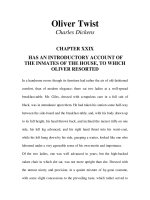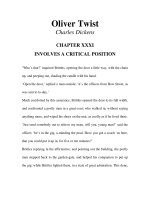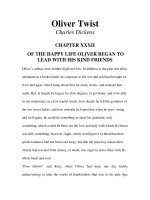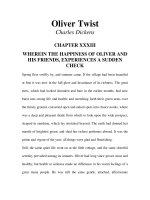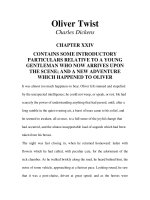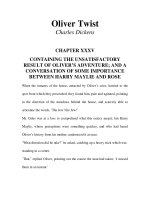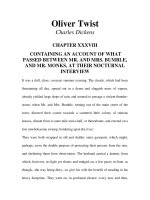Tài liệu LUYỆN ĐỌC TIẾNG ANH QUA TÁC PHẨM VĂN HỌC-Pride and Prejudice -Jane Austen -Chapter 36 ppt
Bạn đang xem bản rút gọn của tài liệu. Xem và tải ngay bản đầy đủ của tài liệu tại đây (25.4 KB, 9 trang )
Pride and Prejudice
Jane Austen
Chapter 36
If Elizabeth, when Mr. Darcy gave her the letter, did not expect it to contain
a renewal of his offers, she had formed no expectation at all of its contents.
But such as they were, it may well be supposed how eagerly she went
through them, and what a contrariety of emotion they excited. Her feelings
as she read were scarcely to be defined. With amazement did she first
understand that he believed any apology to be in his power; and steadfastly
was she persuaded, that he could have no explanation to give, which a just
sense of shame would not conceal. With a strong prejudice against
everything he might say, she began his account of what had happened at
Netherfield. She read with an eagerness which hardly left her power of
comprehension, and from impatience of knowing what the next sentence
might bring, was incapable of attending to the sense of the one before her
eyes. His belief of her sister’s insensibility she instantly resolved to be false;
and his account of the real, the worst objections to the match, made her too
angry to have any wish of doing him justice. He expressed no regret for what
he had done which satisfied her; his style was not penitent, but haughty. It
was all pride and insolence.
But when this subject was succeeded by his account of Mr. Wickham—
when she read with somewhat clearer attention a relation of events which, if
true, must overthrow every cherished opinion of his worth, and which bore
so alarming an affinity to his own history of himself—her feelings were yet
more acutely painful and more difficult of definition. Astonishment,
apprehension, and even horror, oppressed her. She wished to discredit it
entirely, repeatedly exclaiming, ‘This must be false! This cannot be! This
must be the grossest falsehood!’—and when she had gone through the whole
letter, though scarcely knowing anything of the last page or two, put it
hastily away, protesting that she would not regard it, that she would never
look in it again.
In this perturbed state of mind, with thoughts that could rest on nothing, she
walked on; but it would not do; in half a minute the letter was unfolded
again, and collecting herself as well as she could, she again began the
mortifying perusal of all that related to Wickham, and commanded herself so
far as to examine the meaning of every sentence. The account of his
connection with the Pemberley family was exactly what he had related
himself; and the kindness of the late Mr. Darcy, though she had not before
known its extent, agreed equally well with his own words. So far each recital
confirmed the other; but when she came to the will, the difference was great.
What Wickham had said of the living was fresh in her memory, and as she
recalled his very words, it was impossible not to feel that there was gross
duplicity on one side or the other; and, for a few moments, she flattered
herself that her wishes did not err. But when she read and re-read with the
closest attention, the particulars immediately following of Wickham’s
resigning all pretensions to the living, of his receiving in lieu so considerable
a sum as three thousand pounds, again was she forced to hesitate. She put
down the letter, weighed every circumstance with what she meant to be
impartiality—deliberated on the probability of each statement—but with
little success. On both sides it was only assertion. Again she read on; but
every line proved more clearly that the affair, which she had believed it
impossible that any contrivance could so represent as to render Mr. Darcy’s
conduct in it less than infamous, was capable of a turn which must make him
entirely blameless throughout the whole.
The extravagance and general profligacy which he scrupled not to lay at Mr.
Wickham’s charge, exceedingly shocked her; the more so, as she could bring
no proof of its injustice. She had never heard of him before his entrance into
the ——shire Militia, in which he had engaged at the persuasion of the
young man who, on meeting him accidentally in town, had there renewed a
slight acquaintance. Of his former way of life nothing had been known in
Hertfordshire but what he told himself. As to his real character, had
information been in her power, she had never felt a wish of inquiring. His
countenance, voice, and manner had established him at once in the
possession of every virtue. She tried to recollect some instance of goodness,
some distinguished trait of integrity or benevolence, that might rescue him
from the attacks of Mr. Darcy; or at least, by the predominance of virtue,
atone for those casual errors under which she would endeavour to class what
Mr. Darcy had described as the idleness and vice of many years’
continuance. But no such recollection befriended her. She could see him
instantly before her, in every charm of air and address; but she could
remember no more substantial good than the general approbation of the
neighbourhood, and the regard which his social powers had gained him in
the mess. After pausing on this point a considerable while, she once more
continued to read. But, alas! the story which followed, of his designs on
Miss Darcy, received some confirmation from what had passed between
Colonel Fitzwilliam and herself only the morning before; and at last she was
referred for the truth of every particular to Colonel Fitzwilliam himself—
from whom she had previously received the information of his near concern
in all his cousin’s affairs, and whose character she had no reason to question.
At one time she had almost resolved on applying to him, but the idea was
checked by the awkwardness of the application, and at length wholly
banished by the conviction that Mr. Darcy would never have hazarded such
a proposal, if he had not been well assured of his cousin’s corroboration.
She perfectly remembered everything that had passed in conversation
between Wickham and herself, in their first evening at Mr. Phillips’s. Many
of his expressions were still fresh in her memory. She was NOW struck with
the impropriety of such communications to a stranger, and wondered it had
escaped her before. She saw the indelicacy of putting himself forward as he
had done, and the inconsistency of his professions with his conduct. She
remembered that he had boasted of having no fear of seeing Mr. Darcy—that
Mr. Darcy might leave the country, but that HE should stand his ground; yet
he had avoided the Netherfield ball the very next week. She remembered
also that, till the Netherfield family had quitted the country, he had told his
story to no one but herself; but that after their removal it had been
everywhere discussed; that he had then no reserves, no scruples in sinking
Mr. Darcy’s character, though he had assured her that respect for the father
would always prevent his exposing the son.

